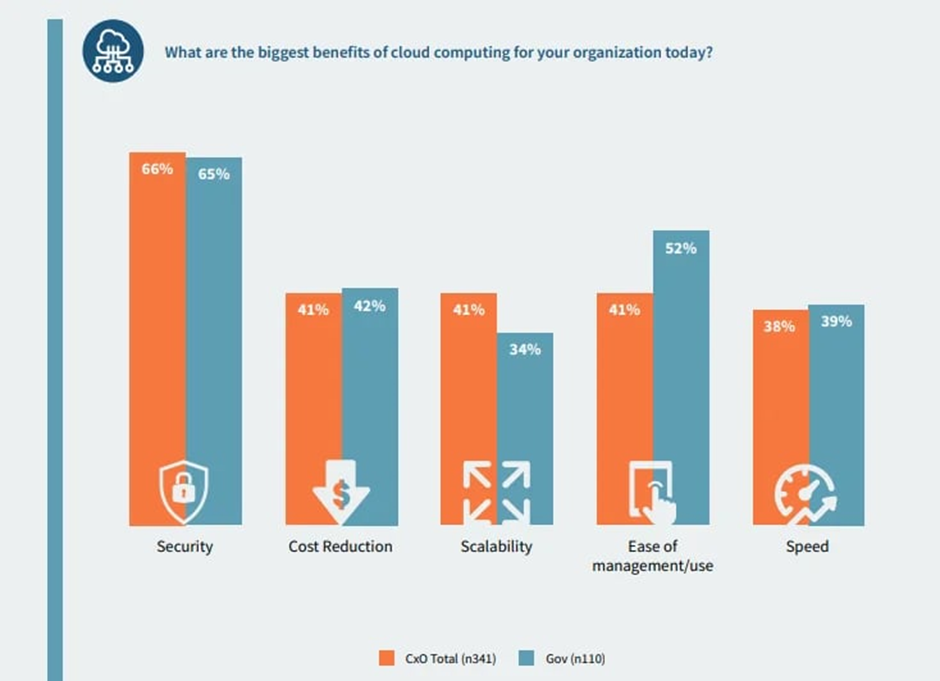As businesses of all sizes face unprecedented challenges due to the pandemic, cost savings and operational agility are more important than ever before.
One path to achieving these objectives is cloud migration – moving workloads from an on-premise environment into a virtual space hosted in the cloud.
Such an approach may sound intimidating and complex, but it can offer major advantages to businesses that make this transition.
In this blog post, we discuss our top 10 reasons why businesses should look into migrating their operations to the cloud.
Also, we'll look at some key business benefits that come with leveraging a cloud infrastructure so that you can decide whether it's worth taking your operations into the virtual world.
What does moving to the cloud mean?
Moving to the cloud means a lot more than simply transferring your data and applications to an off-site server.
It means embracing a whole new way of working; one where your organisation can benefit from unprecedented levels of agility, flexibility, and scalability.
When you move to the cloud, you're essentially taking your business online, which opens up a plethora of opportunities for collaboration, innovation, and growth.
Whether you're looking to reduce costs, increase efficiency, or improve your security posture, the cloud offers a range of benefits that can help you achieve your strategic objectives with ease.
So, if you're considering a move to the cloud, it's important to understand what that really means for your business, and how it can help you stay ahead of the competition in an increasingly digital world.
Why are businesses moving to the cloud?
Businesses are moving to the cloud and it's not hard to see why. The cloud offers numerous benefits for businesses of all sizes.
Firstly, it provides a level of scalability that traditional physical systems cannot match. As businesses grow, they can easily add more resources without having to worry about hardware limitations.
Secondly, cloud storage is generally more secure and reliable than local storage options. This means that businesses can store sensitive information and data with ease, knowing that it is less likely to be compromised.
Lastly, cloud computing is more cost-effective than traditional IT solutions. Rather than having to invest in hardware and software, businesses can simply pay for the services they need on a monthly or yearly basis.
These are just some of the reasons why businesses are making the switch to the cloud.
Different Types of Cloud
Public Cloud
Public clouds are offered by third-party providers to businesses and individuals over the internet, making it easy to access and use applications and services.
Examples include AWS, Azure, IBM, Alibaba, Google Cloud etc.
Private Cloud
Private clouds are owned and operated by organisations themselves, providing better control over data and security.
Examples include Infrastructure as a Service (IaaS), Platform as a Service (PaaS), Software as a Service (SaaS) and Database as a Service (DBaaS).
Hybrid Cloud
A hybrid cloud is a mix of the two, enabling companies to store sensitive data in their private cloud while leveraging the benefits of the public cloud for less sensitive data.
Examples include Public-Private Cloud, Private Cloud Bursting, Multi-Cloud Model, Hybrid Cloud Storage etc.
By understanding the difference between public, private and hybrid cloud, businesses can make an informed decision on which cloud solution to choose that best suits their requirements.

Benefits of Moving to the Cloud
Here are the top 10 reasons why you should move to the cloud:
1. Increased Flexibility and Agility
Moving to the cloud can provide businesses with increased flexibility and scalability.
Cloud computing enables companies to access their data and applications from anywhere, at any time, as long as they have an internet connection.
This makes it much easier for businesses to scale up or down depending on their needs.
Additionally, cloud computing allows businesses to quickly deploy new applications and services without needing to purchase additional hardware or software.
2. Reduced Costs
Cloud computing can also help businesses reduce their costs significantly.
By moving to the cloud, businesses no longer need to invest in expensive hardware and software, as most of the infrastructure is provided by the cloud provider.
Additionally, businesses don’t need to hire IT staff to manage and maintain the hardware or software, which further reduces costs.
3. Improved Security
Security is one of the major concerns when it comes to storing data in the cloud, but cloud providers have invested heavily in security measures such as encryption and authentication protocols that make it very difficult for hackers or other malicious actors to access a company’s data.
Additionally, many cloud providers offer advanced security features such as identity management tools that can help protect against unauthorised access.
4. Faster Deployment Times
Cloud computing also enables businesses to deploy new applications and services much faster than traditional methods.
This is because most of the infrastructure is already set up by the provider, so all a business needs to do is configure its own settings before launching its application or service into production mode.
Also, this makes it much easier for businesses to quickly launch new products and services without needing extensive setup times beforehand.
5. Automation Capabilities
Cloud solutions come with a range of automation capabilities that can help streamline business processes such as data collection, analysis, reporting, customer service etc, which can significantly reduce operational costs while improving efficiency and accuracy across departments within an organisation.
The cloud also offers automated updates that ensure that all applications are running on the latest version of software with minimal effort from IT staff members or developers.
Also, it helps to ensure that all applications are running securely while also providing better performance for users who are accessing them from different devices or locations around the world.
6. Improved Collaboration & Communication
Moving your data and applications to the cloud also makes collaboration between teams much easier than ever before.
With cloud-based tools such as Google Docs or Office 365, team members can easily share documents and collaborate on projects from anywhere in the world without needing physical copies of files or having multiple versions floating around between different people's computers.
7. Better Backup Solutions
The cloud provides businesses with better backup solutions than traditional methods such as tape backups or external hard drives.
Cloud backups are more secure since they are stored offsite, making them less vulnerable to physical damage from disasters such as fires or floods.
Additionally, they can be accessed quickly if needed, making them ideal for disaster recovery scenarios.
8. Improved Performance
Cloud computing can provide improved performance compared to traditional methods due to its distributed architecture.
Since data is stored across multiple servers located around the world, users experience faster response times when accessing applications hosted in the cloud. This makes it ideal for mission-critical applications where performance is essential.
9. Enhanced Analytics Capabilities
Cloud computing also offers enhanced analytics capabilities compared with traditional methods due to its ability to process large amounts of data quickly.
Businesses can use analytics tools such as machine learning algorithms and predictive analytics models that enable them gain valuable insights into customer behaviour, trends etc, which can then be used strategically by decision makers within an organisation.
10. Greater Accessibility
Finally, moving your data and applications into the cloud increases accessibility for employees who may be working remotely or travelling frequently.
By using secure virtual private networks (VPNs), employees can access their work files from anywhere at any time provided they have an internet connection, allowing them greater freedom while still ensuring productivity levels remain high.
Conclusion
This blog post has highlighted the top 10 reasons why moving to the cloud can potentially be beneficial for businesses.
With advantages of moving to the cloud such as increased flexibility, agility, and improved security, businesses considering a move to the cloud will likely experience tangible benefits that reach further than just cost savings.
The potential to automate processes and adjust workflows to changing conditions is also incredibly valuable for many enterprises.
Meanwhile, features such as collaboration and communication tools, better backup solutions, improved performance, enhanced analytics capabilities, and greater accessibility are some of the several advantages of moving to the cloud that could prove invaluable over time.
Simply put, when compared to other deployment models, moving your business operations to the cloud could open up an array of opportunities.
Making decisions about what platforms are best for your business’s operations may be difficult but knowing the advantages of shifting to the cloud should make it all worthwhile in the end.

-1.png?width=552&height=678&name=text-image%20module%20desktop%20(4)-1.png)


.png?width=2000&name=Case%20study%20(21).png)


-2.png?width=422&height=591&name=text%20image%20tablet%20(31)-2.png)







